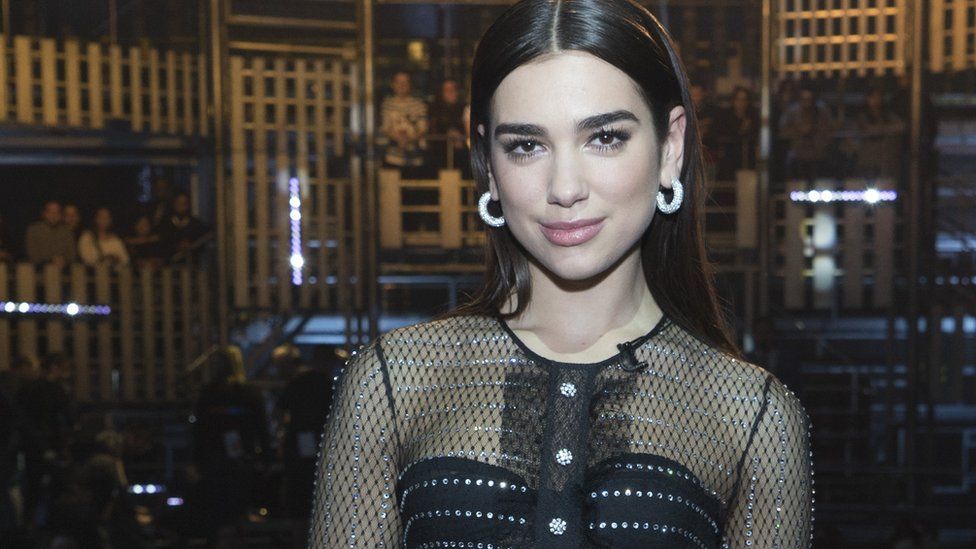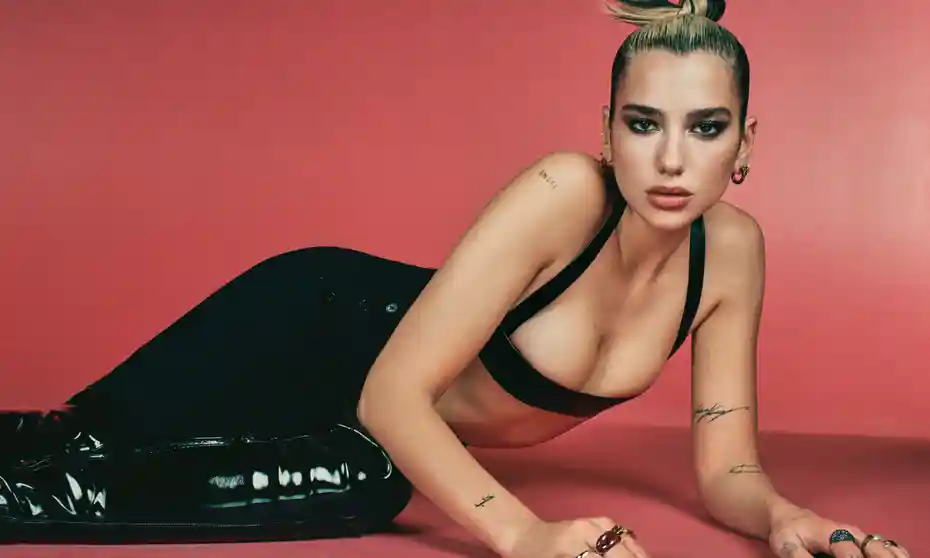
There was a sheet-cake with Dua Lipa’s image backstage in the VIP Forum Club area when she played a two-night stand at L.A.’s Forum this past week, with her U.S. tour just a few dates away from wrapping up, a habit that’s de rigueur for headliners going through the legendary stadium. But, if nothing else, we should be creating a “happy anniversary” cake to commemorate “Future Nostalgia’s” two-year anniversary. Her sophomore album, which was released on March 27, 2020, set an aspirational tone, if not the dominating one, for the next and long-awaited difficult times. It generated the kind of dopamine high that made so many of us — across states, nations, and continents — ecstatic.
The fact that Lipa is only now getting around to performing this music live feels like the perfect way to all but officially commemorate the end of a quarantine era (knock on wood). Maybe it’s a symbolic prize for doing the right thing or doing what we had to do by confining the discotheque to our living rooms for longer than we ever dreamed socially possible. Nobody wanted, and probably still doesn’t want, their album to be regarded as a “lockdown album,” least of all Lipa, who publicly sobbed on Instagram in mid-March 2020 about whether or not to release “Future Nostalgia” in the midst of a worldwide funk.
When it comes to quarantine albums, “Future Nostalgia” and Taylor Swift’s “Folklore” (with or without its worthy adjunct, “Evermore”) will be recognized as the archetypal quarantine albums. These two landmark releases of 2020 barely shared a planet, let alone a genre, yet they brilliantly depicted a populace’s split emotions to the end of normal life as we knew it. The “Folklore” approach was to go within, brood a bit, ballade a little, and, most crucially, use the extra alone time to get things done. And what about the distinct but equal “Nostalgia” aesthetic?
/cloudfront-eu-central-1.images.arcpublishing.com/prisa/ZFZI56T5UZHXHFBBTBQKQXALBA.jpg)
Of course, “Future Nostalgia” would have been a fantastic record regardless of when it was released… It might have come out at any moment in the last 25 or 30 years, thanks to its deliberate mix of late ’70s, ’80s, and ’90s sounds. It felt like a stone-cold pop classic when it was released, and two years of repeat listens have only proven that it wasn’t just a lockdown variation of Stockholm syndrome that made us feel that strongly at the time. The first nine songs on the album are an unbroken string of songs that were or should have been hit singles. Is it really conceivable that “Pretty Please” and “Hallucinating” didn’t chart at number one? That’s only because “Don’t Start Now” and “Levitating” sucked up all the oxygen in the room, or ran out the clock, or whatever metaphor you want to use; practically any “album track” on “Nostalgia” would have been a lesser singer’s single-of-a-lifetime. (Think of the last two songs on the original CD as extra tracks; “Good in Bed” and “Boys Will Be Boys” aren’t any less good; they just seem like they belong on a different, less disco-ey, cheekier album, like one by Lily Allen.)
You could feel the group’s involvement in “Future Nostalgia,” which was one of the reasons it was such a feel-good effort. It took a village of writers and producers to put this album together with Lipa, and it’s a rare kitchen with so many cooks that seems entirely coherent in its musical and lyrical ambitions, miraculously. “Future Nostalgia” is the best dance-pop album released so far this century. And it’s worth pondering if this is due to or because Lipa is a bit more reclusive personality in terms of the spotlight than Lady Gaga or Madonna, who straddle the line between dance music and a diva’s take on the confessional singer/songwriter tradition.
Although she is undeniably a “female alpha,” as she sings in the album’s title, she is far from a cult-of-personality figure. Every element of phrasing and every deep bass lick feels like it was ordained by a single god rather than bargained in a writers’ room on “Future Nostalgia,” which is the exact model of pop cooperation at its best.

Dua Lipa
Ellen Qbertplaya for Variety
During the pandemic, there was something about that collaborative atmosphere that felt subliminally alluring. So it was amazing to witness Lipa’s show at the Forum this week and see just how thoroughly she clearly grasped that and wanted her tour to express a kind of exhilarating community feeling upfront. It was clear from the beginning, in the opening credits… yeah, opening credits. A few of prominent arena singers, such as Kacey Musgraves, have begun to include closing credits in their shows as a gesture of gratitude to their teams.
Lipa, on the other hand, used the huge screen to give each of her ten dancers, as well as her singers and band members, their own billing and a major visual look, as if they were co-stars in a long-running network TV show. It felt promising in a sense that was totally fulfilled — that what we were about to watch was an ensemble piece rather than a star-studded performance.
Lipa does have a couple of solo moments in the show: “We’re Good” (a bonus track from the deluxe “Nostalgia” edition), which had her sharing space with the only prop of the night, a giant lobster, reflecting the underwater music video; and the penultimate “Future Nostalgia,” which took her away from the rest of the cast to let us focus a bit more squarely on the zebra-like stripes of her final outfit.
Lipa was primarily involved as part of a wider gang. That idea came about not because she hasn’t progressed into a near-phenomenal dancer on her own since her first tour — she has — but because it’s a lot of fun to see nearly a dozen people moving around in a loose version of lock-step, or even lock-skip and lock-gallop, to the thick bottom end of neo-disco. (Wasn’t disco always the people’s medium, rather than a celebrity’s?) After that opening credits sequence, the show kicked off properly with Lipa lined up alongside the 10 dancers in what almost looked like a line of health-club treadmills, with a group chant of “Let’s get physical!” that lifted the song out of the realm of carnality and into the pure, joyful community of a nightclub, or a spinning class, depending on your preference.

In a mid-show portion, the floating platform she would later hover upon lowered itself to become the roof of a rave party, and she nearly vanished among the others in the dark, just another reveler in the club, for those 10 minutes or so. Dua Lipa isn’t exactly an Everywoman, to be sure… not when she’s wearing an alien-looking fluorescent yellow-green one-piece with her boots improbably sewed right into the outfit (and matching long gloves out of a Bob Fosse Day-Glo dream).
Although she isn’t “just like us,” the tour has the strange effect of making us feel as though we’re marching down the same catwalk or levitating above it in sympathetic fluidity.
Lipa’s music, which has seemed like the sound of desire for the better part of two years, is now the sound of liberation, as she wraps off her North American arena tour on April 1 in Vancouver and moves on to liberate Europe. Hard times are not behind us (or the world), but if they resurface, we may find ourselves singing “Don’t Start Now,” the theme song of the new decade and this generation’s “I Will Survive.” That breakout single features a charming little artificial cowbell sound four bars into the chorus, and for two years, some fans fantasized what it would be like to watch Lipa physically shake her can to that metallic sound effect. Dreams that have been postponed might sometimes come true.

